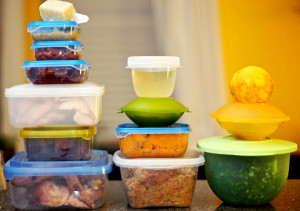My role as dad and food dude has morphed in the past year – I now do most of our food shopping and cooking. Two or three days a week I make meals with the plan that they will also be used for a couple of lunches. I get that this isn’t revolutionary (note the large market for Tupperware) but is new for me.
There is apparently a subgroup of leftover-avoiding folks out there who are also concerned with food waste, leading to the development of a leftover sharing ap in the U.S. LeftoverSwap and now it’s German counterpart foodsharing.de.
According to NPR, child psychiatrist Vero Buschmann was looking for a way to get rid of leftovers without having to throw them away. And she was looking to create a community around similar food waste values.
She found a nonprofit website in Germany that allows her to do both. On a recent evening, her doorbell rings and she buzzes Franzi Zimmerman in to her fifth-floor apartment.
“I have a whole bunch of baked goods I just picked up from the baker,” Buschmann tells her 29-year-old guest. “You can take as much as you want!” She also offers some soup and chutney, made from her leftover produce.
Zimmerman laughs and replies: “Wow, that’s really great. Homemade soup? It doesn’t get better than that!”
Such exchanges between strangers are happening in more than 240 cities across Germany through Foodsharing.de (for English, click on the tiny British flag on the top left), a website that connects people who have free food to give away with people seeking those items.
Some 40 tons of food have been given away via the network since it began online 18 months ago. More than 41,000 people have signed up. The nonprofit website’s creators say their goal is to prevent large amounts of produce, bread and other perishable food from being thrown away.
Food waste is not just a German problem, says website co-founder Valentin Thurin. He’s a Cologne-based filmmaker whose documentary, Taste the Waste, lays out in jolting terms just how much food Europeans throw away each year – 90 million tons worth, to be exact. It’s a phenomenon that costs the European economy more than $130 billion every year — up to half of fruits and vegetables picked at harvest time, he says.
“With food, obviously there is a health risk associated, so we needed to establish some rules,” Thurin says. He says the Web team worked with lawyers to ensure the network didn’t violate any German or European regulations governing food.
As a result, it doesn’t offer meats or other products that have “sell by” dates, concentrating instead on food items with “best before” labels.
There are no inspectors checking on food offered through the network, but consumers are encouraged to go online and rate the food they’ve received, Thurin says.
After a quick review of the food safety guidance at foodsharing.de there might be some stuff that is lost in translation. There is a listing of types of high risk foods (or extra delicate foods) and suggestions on transportation, refrigeration and cleaning and sanitation. The lack of safe endpoint temperatures and proper cooling guidance is a glaring omission.
